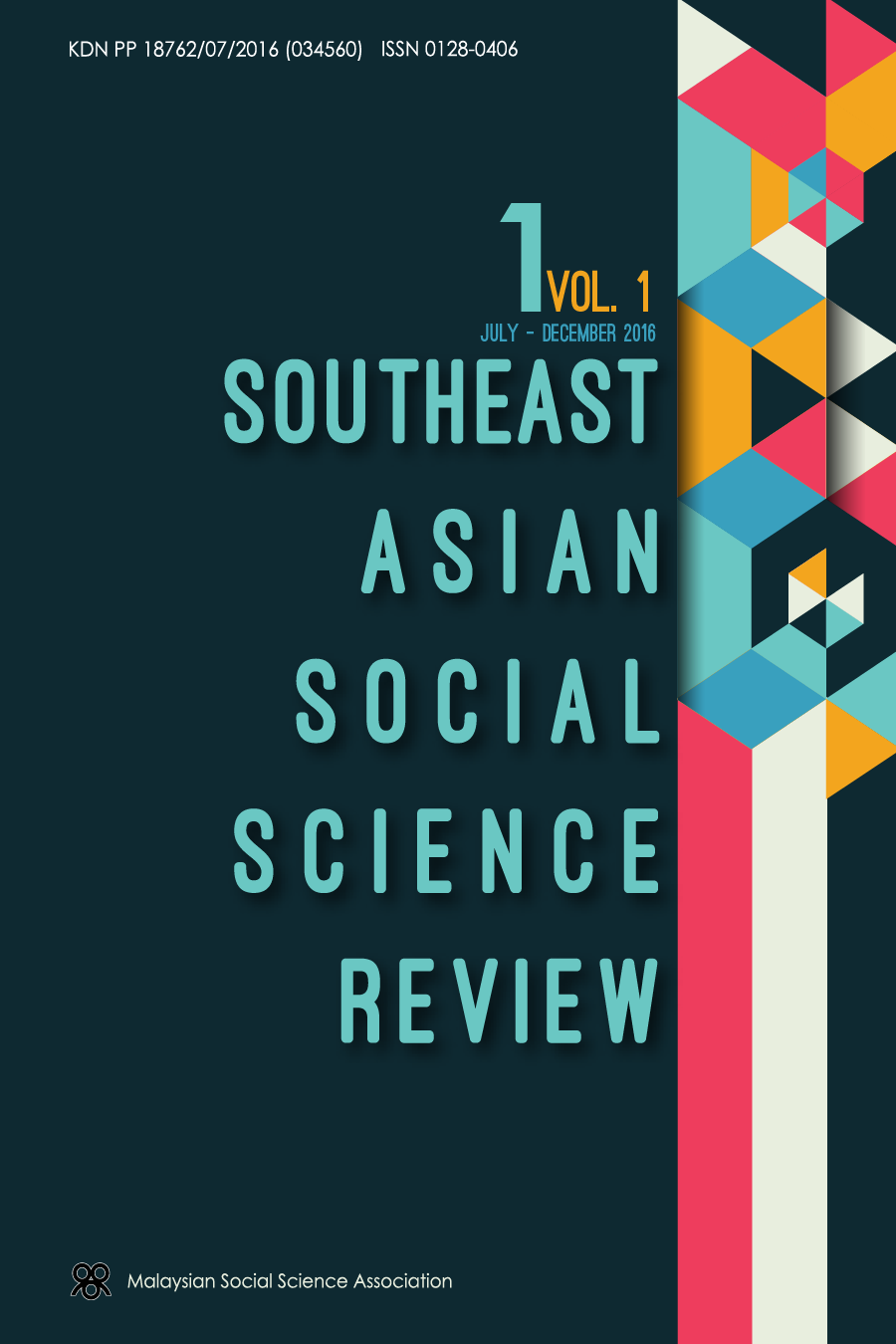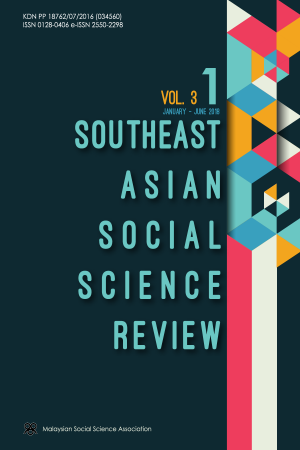The editorial board is happy to announce the birth of the Southeast Asian Social Science Review (SEASSR), a new peer-reviewed journal dedicated to the advancement of critical scholarship in the field of social sciences and humanities. SEASSR is jointly published by the Malaysian Social Science Association (PSSM) and the Institute of Malaysian and International Studies (IKMAS) Universiti Kebangsaan Malaysia, two leading social science institutions in Malaysia and Southeast Asia. Its editors consist of social science scholars from various universities in Malaysia, with a team of renowned senior scholars from various countries who sit as members of the international advisory board.
While there are already a number of sister publications in Malaysia and the region, the emergence of SEASSR as a new publishing platform for the social sciences and humanities should be welcome. Scholars and researchers will have a wider choice through which they can share their research findings and engage in debates on various themes and issues relevant for the advancement of their fields. As indicated in the Guide to Contributors, SEASSR publishes articles, book reviews, conference reports, research notes, interviews, communications, as well as think pieces or commentaries that can contribute towards, or even extend the frontiers of, scholarly debate on various issues of interest to a wide range of scholars and readers. While its empirical focus is on Malaysia and Southeast Asia, the journal welcomes papers on the social sciences and humanities in general as well as those that adopt an interdisciplinary or even transdisciplinary perspective.
Malaysia and the region is a confluence of major world civilisations, a home of peoples of diverse origins, ethnicities, religions and cultures, whose countries practise various political and economic systems. It is also a region that throughout its history has benefited from interactions with different countries and regions in the world. All these form highly rich and diverse sources for research, writing and reflections, offering epistemologies and perspectives that can contribute meaningfully to local knowledge, as well as to the universal corpus of knowledge in the social sciences and humanities.
It is our hope that scholars from Malaysia and the region, as well as those from other parts of the world will find SEASSR a useful platform to publish their works. As a journal that is inclusive and one that believes in upholding and nurturing talent, we will publish works from different generations of scholars, if possible, in every issue. We also hope readers – scholars, students, policy makers and the general public – will find the journal not only informative, but also as a useful source of reference that is engaging and thought-provoking in terms of views, analysis, and perspectives.
The sustainability of the journal is dependent upon its contributors and readers in particular, and the warm support of the scholarly community in general. In this regard, we welcome your comments and criticisms, and very importantly, your works as well as patronage of the journal. Thank you.
Abdul Rahman Embong
Chief Editor
July 2016
1. Prelims.
EDITORIAL
2. Abdul Rahman Embong – Southeast Asian Social Science Review Meets Readers. [Pages 5-6]
ARTICLES
3. Hans-Dieter Evers – Nusantara: Malaysia and the Governance of the South China Sea. [Pages 7-23]
4. Zawawi Ibrahim – From a World-system to a Social Science Knowledge “Scape” Perspective: Anthropological Fieldworking and Transnationalizing Theory-making in the Periphery. [Pages 24-49]
5. Wan Puspa Melati Wan Halim – Role of Sociology and Sociologists: Aspirations and Perceptions of Sociology Students in Malaysia. [Pages 50-69]
6. Chai Choon Lee, Mohd Hazim Shah, Maisarah Hasbullah – The Islamization of Knowledge as a Response to Societal Rationalization and Disenchantment in Malaysia. [Pages 70-92]
7. Heng Siam-Heng – Negative Impacts of Globalization on Society and State. [Pages 93-119]
8. Shazlin Amir Hamzah – Branding the Malaysian Nation: Tracing the Role of Popular Songs in the Construction of and Imagined Community. [Pages 120-140]
COMMENTARY / THINK PIECE
9. Abdul Rahman Embong – Ideas, Idealism and Passion: The Heart of Struggles for a Better World. [Pages 141-144]
BOOK REVIEWS / ULASAN BUKU
10. Abdul Halim Ali – Chin Yee Whah, Nor Hayati Sa’at & Sity Daud (peny.) – Sains Sosial dan Kajian Pembangunan: Kumpulan Rencana Penghormatan Untuk Profesor Abdul Rahman Embong. [Pages 145-152]
11. Muhamad Azwan Abd Rahman – Sandra Heep. 2014. China in Global Finance: Domestic Financial Repression and International Financial Power. [Pages 153-158]
12. Claire Milner – Mohd Yusof Abdullah. 2012. Warisan Seni Bina: Melayu Terengganu. Yayasan DiRaja Sultan Mizan. [Pages 158-163]
13. Contributors. [Pages 164-165]
14. Guide to Contributors. [Pages 166-169]
Abdul Halim Ali, MA, was formerly Chair of Nusantara at the East Asia Institute, Universiti Malaysia Sarawak (UNIMAS).
Abdul Rahman Embong, PhD is emeritus professor in sociology of development & principal fellow at the Institute of Malaysian and International Studies (IKMAS), Universiti Kebangsaan Malaysia.
Chai Choon Lee, PhD is a lecturer in sociology at Red Deer College, Canada.
Hans-Dieter Evers, PhD is emeritus professor of development planning and senior fellow, Centre for Development Research (ZEF), University of Bonn, Germany. He is currently Distinguished Pok Rafeah Chair Professor at the Institute of Malaysian and International Studies (IKMAS), Universiti Kebangsaan Malaysia (2016-2017).
Heng Siam-Heng, PhD was an adjunct professor at the Institute of Malaysian and International Studies (IKMAS), Universiti Kebangsaan Malaysia, and is currently a research affiliate at the Center for Ethnic Studies and Development, Chiang Mai University, Thailand.
Maisarah Hasbullah, PhD is a senior lecturer at the Department of Science and Technology Studies, Faculty of Science, Universiti Malaya.
Claire Milner manages a farming property in Braidwood, New South Wales, and has been engaged in the rescue of heritage buildings in Australia.
Mohd Hazim Shah, PhD was formerly a professor at the Department of Science and Technology Studies, Faculty of Science, Universiti Malaya.
Muhamad Azwan Abd. Rahman, MA is a PhD candidate at the Institute of Malaysian and International Studies (IKMAS), Universiti Kebangsaan Malaysia.
Shazlin Amir Hamzah. PhD is a research fellow at the Institute of Ethnic Studies (KITA), Universiti Kebangsaan Malaysia.
Wan Puspa Melati Wan Halim, PhD is a senior lecturer teaching sociology at the Faculty of Communication and Creative Design, SEGi University, Kuala Lumpur.
Zawawi Ibrahim, PhD is currently professor of anthropology at the Institute of Asian Studies & Faculty of Arts and Social Science, Unversiti Brunei Darussalam (UBD)
Nusantara, governance, maritime sociology, South China Sea, anthropology, Kuwayama’s ‘world-system anthropology’, social science knowledge ‘scape’, transnationalization, hybridization, Malay working class, Sociology, role of sociologists, career, Malaysian universities, students, sociologists-in-training, Malaysian modernity, Islamization of knowledge, instrumental rationalization, disenchantment, legitimation crisis, Globalization, third wave of marketization, state, financial crisis, 9/11, new world order, Nation, state, brand, popular patriotic songs, imagined nation






